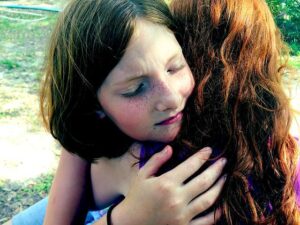
Our preschool-aged kids are precious and although we worry about their fragility, they are much stronger than we understand. We want to watch over them as much as we can, but part of how we cope with life is learning that things don’t always go our way. And this is very true about death. Death is a universal issue for all and incorporating the harsh reality of it into our lives is best done proactively and with loving reassurance.
I’ve recently been back East for the funeral of my older sister, Patty, the eldest of my siblings. There’s been a balance between ritual and chaos from moment-to-moment, and it’s been a struggle to process my feelings at times. I accept that I’ll never get a chance to say all of the things I wanted to say to her and know that I will miss her for the rest of my life. My niece and nephew who are both in their early 20s were never educated about death and have never had anyone close to them pass away, so it was even harder than it could have been to face the unfortunate death of their mother.
My own two girls (who are now in their teens) have not had a life sheltered from death. Since before they were small enough to understand the finality of death, they have been allowed to experience grief for pets. The first pet to die was a fish—eaten by the cat while we were on vacation. It was a small introduction to the finality of death and while we read books about the death of a pet and had a funeral ceremony for the fish after the loss, I realized I should have been exposing the children in a very gentle way through books before they experienced the first loss. I’ve made sure to address the issue over the years proactively with books and discussions and gently allowing them to experience the loss of a few pets. Since then, they’ve also had the very real grief of schoolmates and relatives passing on—many all too soon. We have taught them the rituals of grief and honoring the departed as part of the process of recovery. We hope we modeled it well for them and that they will be ready for that day when they lose a parent.
In trying to protect their kids, parents can sometimes do misguided things such as try to replace a lost guppy with another one, or even try to do this with a cat or bird! This practice is misguided in that it does not allow the child to process through their love for a specific pet. It’s also very unlikely to work. Others tell their children that the pet moved away to a farm somewhere, which leaves the child lost and without closure. We fear what the burden of grief will do to our children at such a tender age. But grief is part of living. A child that never experiences death in their young life will have no tools to process grief when they grow older.
For a generation of kids, they first experienced the concept of death and grief with THE LION KING. As films go, THE LION KING is traumatic, but a valuable first lesson in death: kids see a child interacting with their dead parent, unable to wake them, and the absence of that parent’s protection makes in their young life. Eventually, the child grows into their own agency, and triumphs– and that’s an excellent first look at recovery. BAMBI also loses his mother and is consoled by his father.
It’s important that kids understand what death is without confusion and without platitudes that make the adults around them feel better. Death is natural. Losing a pet will naturally devastate a young child. Losing an uncle or grandparent is hard, but it’s an important first step before the people even closer to them pass on.
It’s also important that kids understand that their grief is valid. Adults and other kids can be impatient with a grieving child. Your child needs to know that a person’s grief– whether their grief or someone else’s– is not on a timetable. A grieving child needs patience and respect to move beyond their grief.
There’s a couple of books we’d like to recommend for parents who are encountering their child’s grief for the first time. For the child, Saying Goodbye to Lulu by Corrine Demas gives a relatable account of the grief cycle, as a child experiences it. For parents, we recommend “It’s Okay That You’re Not Okay”, by Megan Devine. for what it can teach both the grieving and those around the grieving about how our culture doesn’t process grief properly.
If you’d like to discuss a place at Creekside Kids for your kids, we’d like to invite you to click this embedded link to schedule an appointment. Let’s get to know each other! Like us on Facebook to follow our stories for news and updates. We’re located at 1201 W Cheyenne Road, Colorado Springs, CO 80906, and we can be reached at (719) 635-9111. Our new hours of operation are 6:45 am until 5:45 pm, Monday through Friday.
 1201 W Cheyenne Rd
1201 W Cheyenne Rd